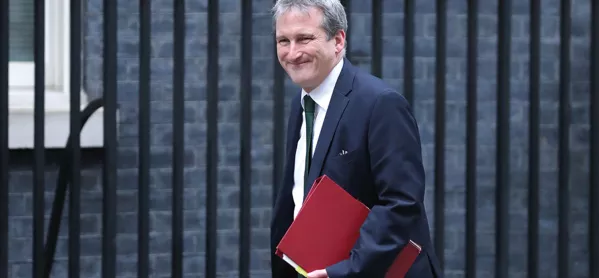Imagine yourself as Damian Hinds. The role of a new cabinet minister is very isolated. As the new Tory education secretary, your allies are few. Within your department, you have a suspicious civil service and ambitious junior ministers who you don’t have the right to hire or fire. Your boss is, in this case, a very, very weak prime minister who sees education as one of her few areas of political opportunity and so is likely to be developing policy and briefing the media in parallel to you, quite possibly without telling you. Just about everyone else who wants to see you is, in essence, a pluralistic interest group - unions, exam boards, lobbyists, thinktanks, and so on - each with their own agendas to push.
And you’ve inherited two massively intractable policy problems: the overhaul of the national formula for school funding amid tightening budgets, and the deepening crisis within teacher recruitment and retention.
Both are vastly complicated with a near infinite number of competing interests who want their say. Both need resolving urgently. Neither promises a lot of glory: sort them out without too much political trouble and you’ll be considered to be doing the bare minimum; mess them up and you’ve got problems on the same scale as the NHS winter crisis.
And all this before you even start thinking about what you might want to do and how you might make your mark.
Setting the tone
So you’re Damian Hinds, you’ve never held a cabinet position before and your knowledge of education may need work. To make things more awkward, you’re following one of recent history’s most popular education secretaries. Justine Greening tried (wo)manfully to effect solutions to these twin problems and was fired at least in part because she was willing to talk to people in the process of doing so.
So perhaps the most important early decision you’ll make - possibly one of the most important of your tenure - will be appointing policy and political advisers. After all, they’re the only people you can really trust. And from an external perspective, they will set the tone and ambition of your period in office. They will also very subtly tell us what kind of ed-sec you might turn out to be.
Take, for example, Michael Gove’s era of shock-and-awe education reform. Through most of this period, two Westminster legends had his ear. The Good Angel was Sam Freedman, who thought long and hard about reform, understood the research and came at the job from a largely apolitical position. The Bad Angel was Dominic Cummings, who saw joining government as a nihilistic opportunity to rip apart what he saw as the Blob, an intractable tier of progressive governance that stood in the way of any kind of change for the better. He took Gove to all-out war with the Department for Education civil service - and won.
Both offered often contrasting advice that Gove wanted to hear, that he needed to hear. They set him on a direction of travel that achieved enormous change (for better or worse) despite almost the entire education system being out to stop him.
The contrast with the people who Greening gathered around her could not be more stark. Centrists and pragmatists who wanted to rebuild and fix in the aftermath of Gove and Cummings’ rampage, they sought to bring as many interest groups and unions into their big tent as they could. Improving social mobility through consensual policymaking was the name of the game. It was this warm approach to Gove’s enemies that left Greening exposed with the right wing of the Tory party and ultimately did for her.
Which set of advisers and advice was right? It’s hard to know. Undoubtedly, Greening would have had many more enemies if she’d had her own version of Cummings dripping right-wing poison into her ear. But, on the other hand, is it just possible that she would still be education secretary?
@Ed_Dorrell




